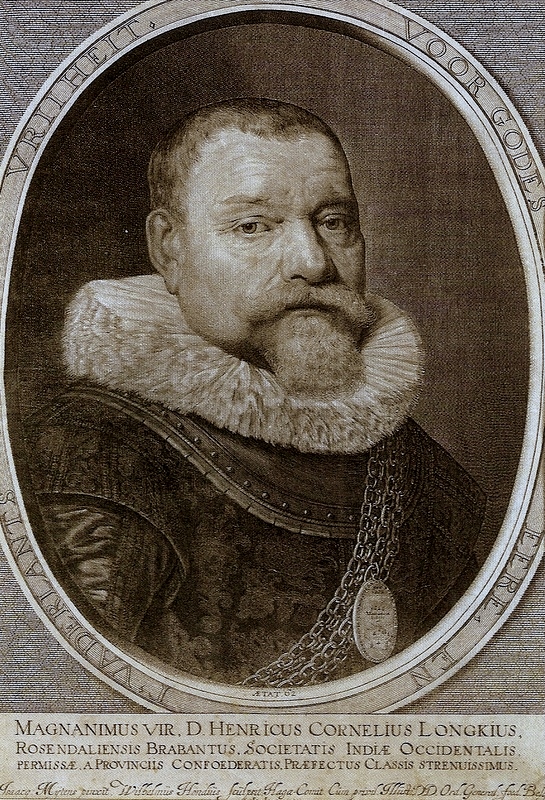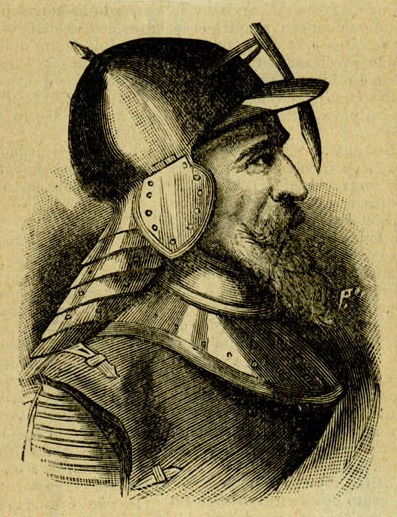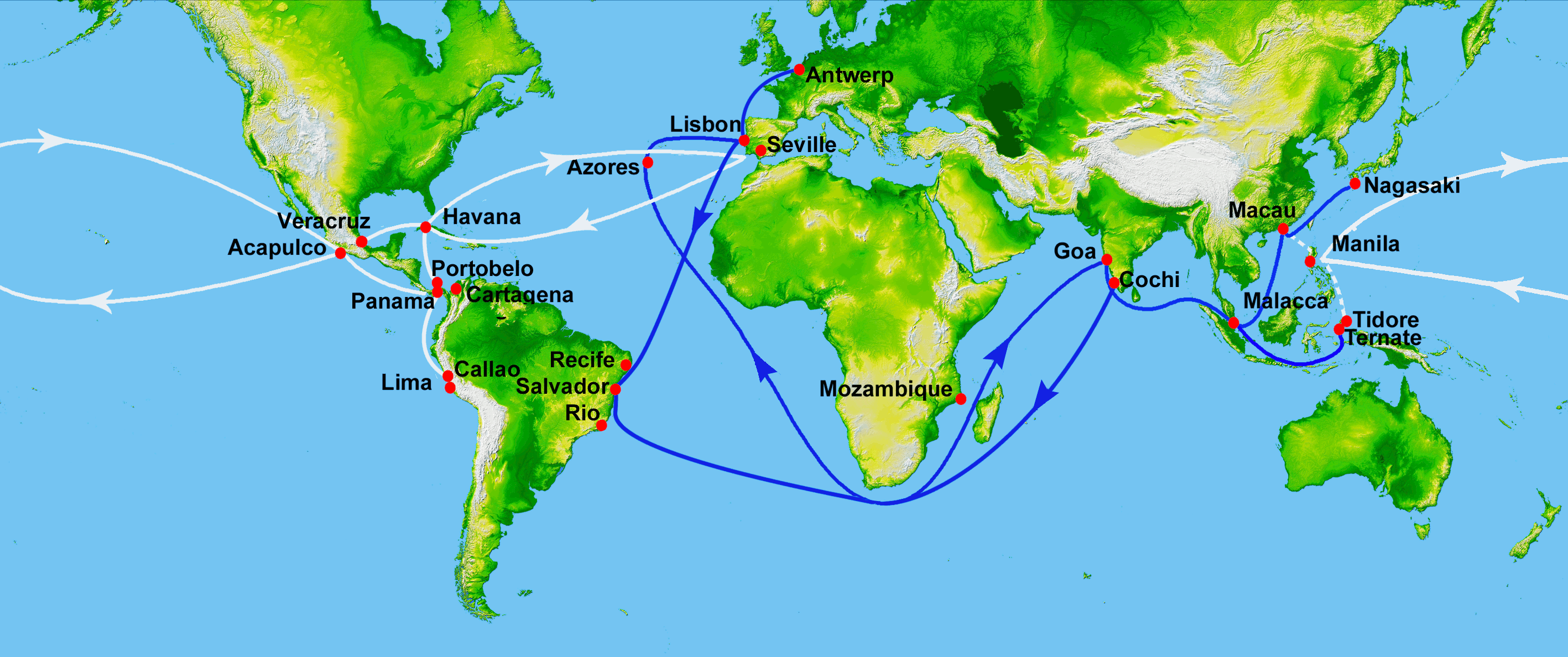|
Hendrick Lonck
Adm. Hendrick Corneliszoon Lonck (or Loncque and Loncq) (born 1568, Roosendaal – 10 October 1634, Amsterdam), a Dutch naval hero, was the first Dutch sea captain to reach the New World. Early years He was born in Roosendaal in the southern Netherlands, of Brabant origin. His parents were Cornelis Pieterszoon Lonck and Dichna Heinrich. He was a full cousin of the Zeeland Vice Admiral Cornelis Symons Son Loncque. In 1604, he married Grietgen Lenaerts in Antwerp. Career In 1606, Lonck captained the ''Witte Leeuw'' (White Lion), a 320-ton merchant ship armed for war, and approached the Gulf of St. Lawrence. Near Tadoussac, he boarded two of Pierre Dugua, Sieur de Mons' ships, pillaging them for cannons, furs, mounts, and munitions. In 1623 and 1624, Lonck participated in the expedition of Admiral Willem de Zoete against the Barbary Coast pirates. Having made admiral by 1628, Lonck, in the service of the Dutch West Indies Company, joined Admiral Piet Hein in the Battle in ... [...More Info...] [...Related Items...] OR: [Wikipedia] [Google] [Baidu] |
Wilhelm Hondius - Hendrik Lonck , the Dutch national anthem
{{Disambiguation ...
Wilhelm may refer to: People and fictional characters * William Charles John Pitcher, costume designer known professionally as "Wilhelm" * Wilhelm (name), a list of people and fictional characters with the given name or surname Other uses * Mount Wilhelm, the highest mountain in Papua New Guinea * Wilhelm Archipelago, Antarctica * Wilhelm (crater), a lunar crater See also * Wilhelm scream, a stock sound effect * SS ''Kaiser Wilhelm II'', or USS ''Agamemnon'', a German steam ship * Wilhelmus "Wilhelmus van Nassouwe", usually known just as "Wilhelmus" ( nl, Het Wilhelmus, italic=no; ; English translation: "The William"), is the national anthem of both the Netherlands and the Kingdom of the Netherlands. It dates back to at least 1572 ... [...More Info...] [...Related Items...] OR: [Wikipedia] [Google] [Baidu] |
Piet Pieterszoon Hein
Piet Pieterszoon Hein (25 November 1577 – 18 June 1629) was a Dutch admiral and privateer for the Dutch Republic during the Eighty Years' War. Hein was the first and the last to capture a large part of a Spanish treasure fleet which transported huge amounts of gold and silver from Spanish America to Spain. The amount of silver taken was so big that it resulted in the rise of the price of silver worldwide and the near bankruptcy of Spain. Early life Hein was born in Delfshaven (now part of Rotterdam), the son of a sea captain, and he became a sailor while he was still a teenager. During his first journeys he suffered from extreme motion sickness. In his twenties, he was captured by the Spanish, and served as a galley slave for about four years, probably between 1598 and 1602, when he was traded for Spanish prisoners. Between 1603 and 1607, he was again held captive by the Spanish, when captured near Cuba. Naval career Dutch East India Company In 1607, he joined t ... [...More Info...] [...Related Items...] OR: [Wikipedia] [Google] [Baidu] |
People From Roosendaal
A person ( : people) is a being that has certain capacities or attributes such as reason, morality, consciousness or self-consciousness, and being a part of a culturally established form of social relations such as kinship, ownership of property, or legal responsibility. The defining features of personhood and, consequently, what makes a person count as a person, differ widely among cultures and contexts. In addition to the question of personhood, of what makes a being count as a person to begin with, there are further questions about personal identity and self: both about what makes any particular person that particular person instead of another, and about what makes a person at one time the same person as they were or will be at another time despite any intervening changes. The plural form "people" is often used to refer to an entire nation or ethnic group (as in "a people"), and this was the original meaning of the word; it subsequently acquired its use as a plural form of per ... [...More Info...] [...Related Items...] OR: [Wikipedia] [Google] [Baidu] |
Burials At The Oude Kerk, Amsterdam
Burial, also known as interment or inhumation, is a method of final disposition whereby a dead body is placed into the ground, sometimes with objects. This is usually accomplished by excavating a pit or trench, placing the deceased and objects in it, and covering it over. A funeral is a ceremony that accompanies the final disposition. Humans have been burying their dead since shortly after the origin of the species. Burial is often seen as indicating respect for the dead. It has been used to prevent the odor of decay, to give family members closure and prevent them from witnessing the decomposition of their loved ones, and in many cultures it has been seen as a necessary step for the deceased to enter the afterlife or to give back to the cycle of life. Methods of burial may be heavily ritualized and can include natural burial (sometimes called "green burial"); embalming or mummification; and the use of containers for the dead, such as shrouds, coffins, grave liners, and bur ... [...More Info...] [...Related Items...] OR: [Wikipedia] [Google] [Baidu] |
Admirals Of The Navy Of The Dutch Republic
Admiral is one of the highest ranks in some navies. In the Commonwealth nations and the United States, a "full" admiral is equivalent to a "full" general in the army or the air force, and is above vice admiral and below admiral of the fleet, or fleet admiral. Etymology The word in Middle English comes from Anglo-French , "commander", from Medieval Latin , . These evolved from the Arabic () – (), “king, prince, chief, leader, nobleman, lord, a governor, commander, or person who rules over a number of people,” and (), the Arabic article answering to “the.” In Arabic, admiral is also represented as (), where () means the sea. The 1818 edition of Samuel Johnson's '' A Dictionary of the English Language'', edited and revised by the Rev. Henry John Todd, states that the term “has been traced to the Arab. emir or amir, lord or commander, and the Gr. , the sea, q. d. ''prince of the sea''. The word is written both with and without the d, in other languages, as w ... [...More Info...] [...Related Items...] OR: [Wikipedia] [Google] [Baidu] |
1634 Deaths
Events January–March * January 12– After suspecting that he will be dismissed, Albrecht von Wallenstein, supreme commander of the Holy Roman Empire's Army, demands that his colonels sign a declaration of personal loyalty. * January 14– France's ''Compagnie normande'' obtains a one-year monopoly on trade with the African kingdoms in Guinea. * January 19– Charles IV, Duke of Lorraine abdicates in favor of his brother Nicholas Francis, Duke of Lorraine, Nicholas II, who is only able to hold the throne for 75 days. * January 24– Ferdinand II, Holy Roman Emperor, signs a classified order dismissing Albrecht von Wallenstein, the supreme commander of the Imperial Army. * February 18– Emperor Ferdinand II's dismissal of Commander Wallenstein for high treason, and the order for his capture, dead or alive, is made public. * February 25– Rebel Scots and Irish soldiers assassinate Kingdom of Bohemia, Bohemian military leader Albrecht von ... [...More Info...] [...Related Items...] OR: [Wikipedia] [Google] [Baidu] |
1568 Births
Year 1568 ( MDLXVIII) was a leap year starting on Thursday (link will display the full calendar) of the Julian calendar. Events January–June * January 6– 13 – In the Eastern Hungarian Kingdom, the delegates of Unio Trium Nationum to the Diet of Torda make Europe's first declaration of religious freedom, adopted on January 28 as the Edict of Torda. * February 17 – Treaty of Adrianople (sometimes called the Peace of Adrianople): The Habsburgs agree to pay tribute to the Ottomans. * March 23 – The Peace of Longjumeau ends the Second War of Religion in France. Again Catherine de' Medici and Charles IX make substantial concessions to the Huguenots. * May 2 – Mary, Queen of Scots, escapes from Loch Leven Castle. * May 13 – Battle of Langside: The forces of Mary, Queen of Scots are defeated by a confederacy of Scottish Protestants, under James Stewart, Earl of Moray, her half-brother. * May 16 – Mary, Queen of Scots, flees t ... [...More Info...] [...Related Items...] OR: [Wikipedia] [Google] [Baidu] |
Matias De Albuquerque
Matias de Albuquerque (Olinda, Colonial Brazil, colony of Brazil, 1580s – Lisbon, Kingdom of Portugal, 9 June 1647), the first and only Count of Alegrete, was a Portuguese colonial administrator and soldier. He was nicknamed "Hero of Two Continents" for his performance, beginning in 1624, against the Dutch invaders of colonial Brazil (Captaincy of Pernambuco) and for his role, beginning in 1641, as a general in Portugal, fighting for king John IV of Portugal, John IV during the Portuguese Restoration War, where he won the battle of Montijo over the Spaniards in 1644. For this victory he was rewarded the title of Count of Alegrete by the king. The youngest son of Jorge de Albuquerque Coelho, Matias was baptized as Paulo de Albuquerque, but he changed his name to Matias to honor his relative and godfather, Matias de Albuquerque, who was the Viceroy of India. Career The colony of Pernambuco in Brazil had been granted, in trust, to Matias's brother, Duarte de Albuquerque Coelho, ... [...More Info...] [...Related Items...] OR: [Wikipedia] [Google] [Baidu] |
Pernambuco
Pernambuco () is a state of Brazil, located in the Northeast region of the country. With an estimated population of 9.6 million people as of 2020, making it seventh-most populous state of Brazil and with around 98,148 km², being the 19th-largest in area among federative units of the country, it is the sixth-most densely populated with around 89 people per km². Its capital and largest city, Recife, is one of the most important economic and urban hubs in the country. Based on 2019 estimates, the Recife Metropolitan Region is seventh-most populous in the country, and the second-largest in northeastern Brazil. In 2015, the state had 4.6% of the national population and produced 2.8% of the national gross domestic product (GDP). The contemporary state inherits its name from the Captaincy of Pernambuco, established in 1534. The region was originally inhabited by Tupi-Guarani-speaking peoples. European colonization began in the 16th century, under mostly Portuguese rule in ... [...More Info...] [...Related Items...] OR: [Wikipedia] [Google] [Baidu] |
States Of Brazil
The federative units of Brazil ( pt, unidades federativas do Brasil) are subnational entities with a certain degree of autonomy (self-government, self-regulation and self-collection) and endowed with their own government and constitution, which together form the Federative Republic of Brazil. There are 26 states (') and one federal district ('). The states are generally based on historical, conventional borders which have developed over time. The states are divided into municipalities A municipality is usually a single administrative division having corporate status and powers of self-government or jurisdiction as granted by national and regional laws to which it is subordinate. The term ''municipality'' may also mean the go ..., while the Federal District (Brazil), Federal District assumes the competences of both a state and a municipality. Government The government of each state of Brazil is divided into executive branch, executive, legislative branch, legislative and jud ... [...More Info...] [...Related Items...] OR: [Wikipedia] [Google] [Baidu] |
Olinda
Olinda () is a historic city in Pernambuco, Brazil, in the Northeast Region, Brazil, Northeast Region. It is located on the country's northeastern Atlantic Ocean coast, in the Recife metropolitan area, Metropolitan Region of Recife, the state capital. It has a population of 393,115 people, covers , and has a population density of 9,437 inhabitants per square kilometer. It is noted as one of the best-preserved colonial cities in Brazil, and has been inhabited since 1535. As the former capital of the Captaincy of Pernambuco during the Colonial Brazil, colonial era, Olinda has many historical buildings--the center was declared a UNESCO World Heritage Site in 1982--and a rich culture. The Brazilian Carnival, ''Carnaval'' of Olinda, a popular street party, is very similar to traditional Portuguese carnivals, with the addition of African influenced dances, reflecting the history of the Northeast. All the festivities are celebrated on the streets with no bleachers or roping, and unlike in ... [...More Info...] [...Related Items...] OR: [Wikipedia] [Google] [Baidu] |
Spanish Treasure Fleet
The Spanish treasure fleet, or West Indies Fleet ( es, Flota de Indias, also called silver fleet or plate fleet; from the es, label=Spanish, plata meaning "silver"), was a convoy system of sea routes organized by the Spanish Empire from 1566 to 1790, which linked Spain with its territories in the Americas across the Atlantic. The convoys were general purpose cargo fleets used for transporting a wide variety of items, including agricultural goods, lumber, various metal resources such as silver and gold, gems, pearls, spices, sugar, tobacco, silk, and other exotic goods from the overseas territories of the Spanish Empire to the Spanish mainland. Spanish goods such as oil, wine, textiles, books and tools were transported in the opposite direction. The West Indies fleet was the first permanent transatlantic trade route in history. Similarly, the related Manila galleon trade was the first permanent trade route across the Pacific. The Spanish West and East Indies fleets are considered ... [...More Info...] [...Related Items...] OR: [Wikipedia] [Google] [Baidu] |

_1938.jpg)







